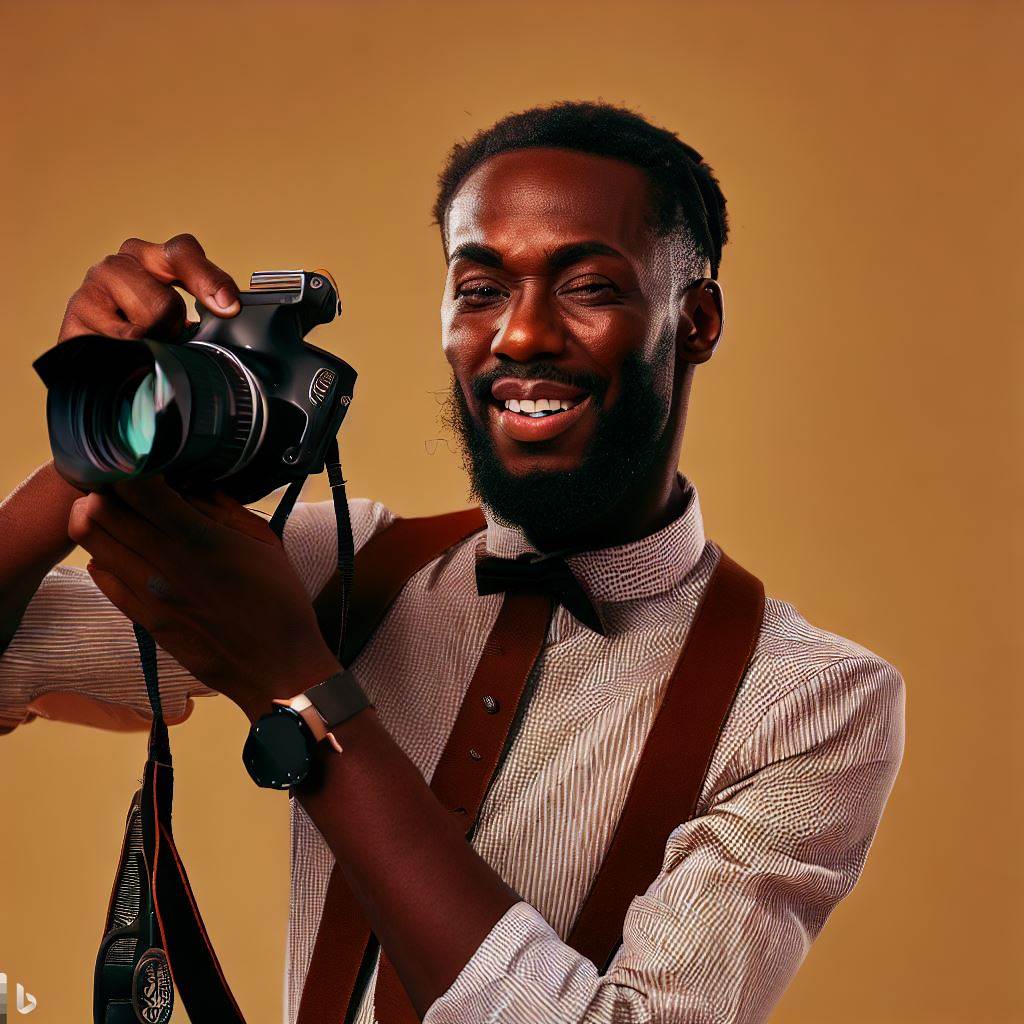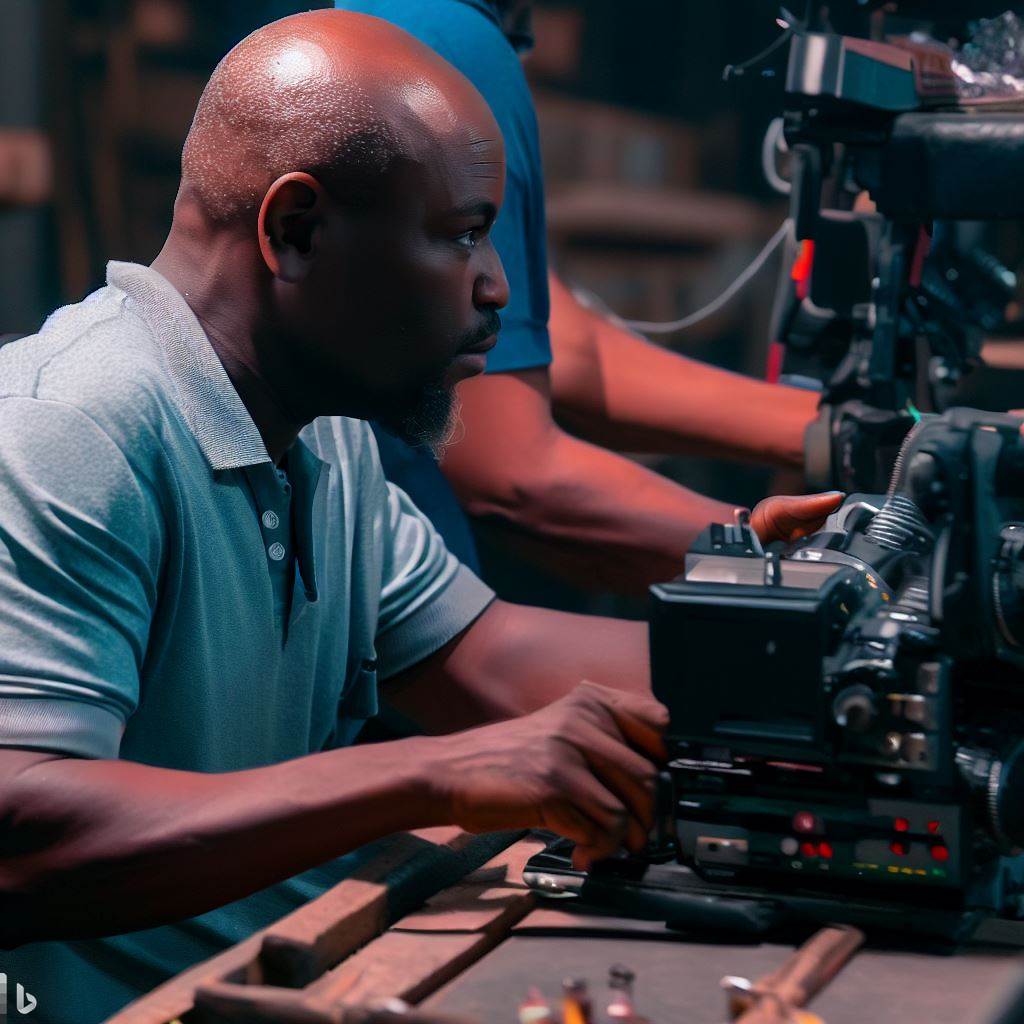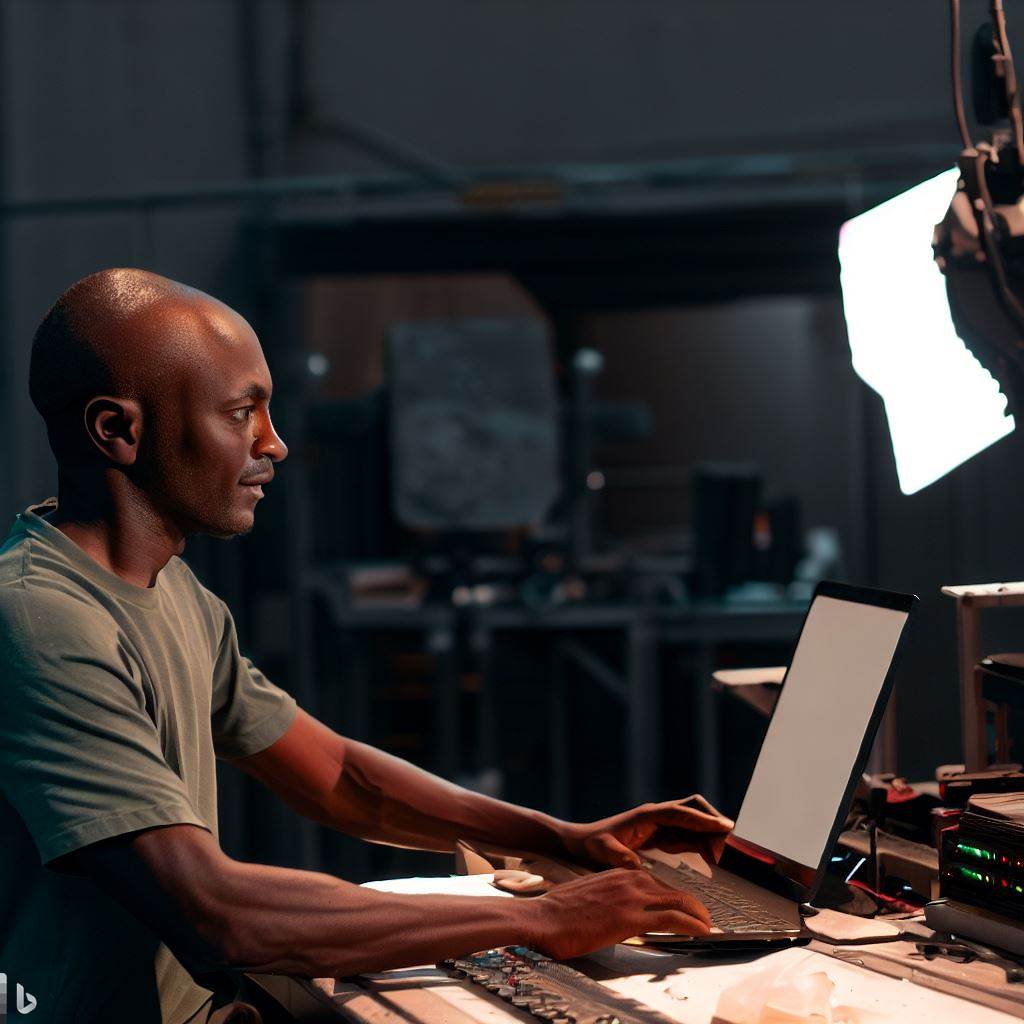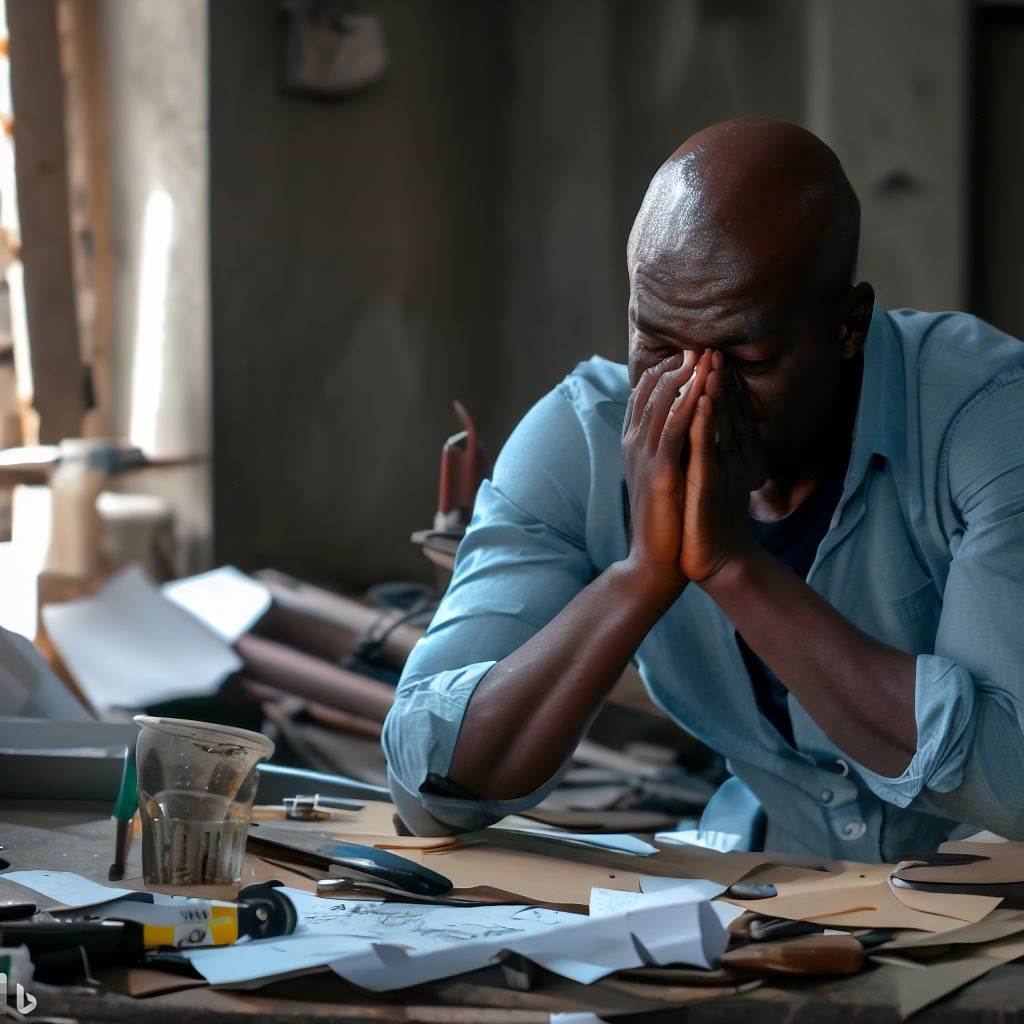Introduction
Welcome to a behind-the-scenes glimpse into the day-to-day life of a professional Nigerian photographer.
The purpose of the blog post is to provide an insider’s look into the life of a professional Nigerian photographer.
In this blog post, we aim to give you an exclusive insight into the challenges, joys, and creative process of a professional Nigerian photographer.
Prepare to be transported to a world of artistry, culture, and untouched beauty as we follow the footsteps of a Nigerian photographer.
Background on Nigerian Photography
The thriving Nigerian photography industry
Nigerian photography has experienced tremendous growth in recent years, becoming a thriving industry within the country.
From fashion to documentary, there are various genres that Nigerian photographers excel in.
These photographers have a keen eye for capturing the essence of their subjects, whether it be the vibrant colors of a traditional wedding or the raw emotions of everyday life in the bustling streets of Lagos.
With the advent of social media platforms like Instagram, Nigerian photographers have found an avenue to showcase their work to a global audience.
This exposure has led to collaborations with international brands and photographers. The Nigerian photography industry is not limited to just professionals.
Many amateur photographers have also emerged, using their smartphones to capture stunning images and share them online.
This accessibility has contributed to the industry’s success.
The importance of photography in Nigerian society
Photography holds immense importance in Nigerian society, as it serves as a visual documentation of the country’s rich culture and diverse population.
It allows Nigerians to preserve their history and traditions for future generations. Photographs are also a means of storytelling in Nigerian society.
They have the power to convey powerful messages, ignite conversations, and bring about social change.
Photographs can capture the struggles and triumphs of the Nigerian people, shedding light on important issues.
Transform Your Career in Nigeria
Discover unmatched expertise with our personalized Career Consulting service. Navigate Nigeria’s job market with a strategy tailored just for you.
Get StartedFurthermore, photography plays a crucial role in the Nigerian entertainment industry.
The country’s vibrant music and film industry heavily rely on visually captivating promotional materials, such as album covers and movie posters, to attract audiences.
Statistics or examples to support the significance of photography in Nigeria
According to a recent survey, over 70% of Nigerians believe that photography is important in preserving cultural heritage.
In 2019, Nigerian photographer, Akinbode Akinbiyi, won the prestigious Seydou Keïta Photography Prize, highlighting the talent and recognition Nigerian photographers receive on an international level.
Several Nigerian photographers have also gained significant followings on social media platforms.
For instance, TY Bello, a renowned Nigerian photographer, has over one million followers on Instagram, which demonstrates the impact and reach of Nigerian photography.
Furthermore, photography exhibitions and festivals, such as LagosPhoto Festival, attract thousands of visitors each year, signifying the increasing interest and appreciation for photography in Nigeria.
In short, Nigerian photography has become a dynamic and influential industry, showcasing the country’s culture, sparking conversations, and providing avenues for talented photographers to flourish.
Read: Photography Equipment: A Buying Guide for Nigerian Photographers
Meet the Photographer: Introduction and Background
The professional Nigerian photographer
In the vibrant and diverse world of Nigerian photography, there is one name that stands out among the rest.
Meet Adeolu Adeniyi, a talented and passionate photographer who has captured the essence of Nigeria through his lens.
Photographer’s name and background information
Adeolu Adeniyi was born and raised in Lagos, Nigeria, a city that inspired his love for photography.
His interest in capturing everyday moments and preserving memories began at an early age.
After completing his education in Fine Arts, Adeolu decided to pursue photography full-time.
He saw it not just as a profession, but as a way to tell stories and evoke emotions through his images.
Photographer’s experience and achievements
Over the years, Adeolu has honed his skills and taken on various projects that have garnered him recognition and acclaim.
His work has been featured in renowned publications like National Geographic and Vogue, showcasing his unique perspective on Nigerian culture and people.
Adeolu’s talent has also caught the eye of celebrities and public figures, leading to collaborations and high-profile assignments.
From capturing intimate moments with musicians and artists to covering grand events, he has proven his versatility and ability to adapt to different environments.
Beyond his commercial success, Adeolu is deeply committed to giving back to his community.
He regularly conducts workshops and mentoring programs, sharing his knowledge and inspiring young photographers to pursue their passion.
With his dedication and talent, Adeolu has not only made a name for himself in the Nigerian photography scene, but also put the country on the global map of artistic excellence.
As he continues to push boundaries and challenge norms, Adeolu Adeniyi remains a beacon of inspiration for aspiring photographers in Nigeria and beyond.
Read: Photography Schools in Nigeria: Where Talent Meets Technique
Publish Your Professional Profile, Business or Brand
Showcase your expertise, gain trust, and boost visibility instantly on Professions.ng.
Publish NowA Typical Day in the Life of a Nigerian Photographer
Start with the photographer’s morning routine
Every morning, the Nigerian photographer wakes up before sunrise, eager to capture the day’s beauty.
The photographer starts the day with a refreshing cup of coffee, fueling their passion and creativity.
After enjoying breakfast, the photographer checks the weather forecast to plan the day’s outdoor shoots.
The Photographer’s equipment preparation and maintenance
The photographer carefully inspects their camera gear, ensuring that each lens is clean and all batteries are fully charged.
They pack their camera bag with all the necessary equipment, including spare memory cards and a sturdy tripod.
Regular maintenance of camera gear is vital, so the photographer cleans the lenses and checks for any technical issues.
Photographer’s work schedule and occupation-specific tasks
The photographer begins the day by editing the previous day’s photos, ensuring they fulfill the client’s requirements.
Once their administrative tasks are complete, the photographer embarks on various assignments, ranging from portraits to landscapes.
They attend meetings with clients, discussing the upcoming projects and understanding their specific vision.
Challenges or obstacles the photographer may encounter during a day
Nigerian photographers often face the challenge of working in unpredictable weather conditions, such as sudden rainstorms.
Locating the perfect shooting locations can be time-consuming, especially in crowded cities with limited access to picturesque spots.
The photographer must also adapt to working under different lighting conditions and adjust camera settings accordingly.
Though challenging, these obstacles contribute to the photographer’s growth and refine their skills as professionals.
Basically, a typical day in the life of a Nigerian photographer is filled with dedication, creativity, and adaptability.
From the morning routine to equipment preparation, their passion for capturing remarkable visuals shines through.
Despite the challenges encountered, they persist in delivering exceptional work that tells compelling stories through their lens.
Read: Nigerian Wedding Photography: A Beautiful and Lucrative Niche
The Artistic Process: Behind the Lens
The Photographer’s Creative Process and Artistic Vision
- Before picking up their camera, the photographer starts by brainstorming ideas and concepts for each photoshoot.
- They draw inspiration from various sources such as nature, fashion, art, and even past experiences.
- By visualizing the end result, the photographer develops a unique perspective for their images.
- They constantly seek new locations, lighting techniques, and angles to push their artistic boundaries.
- The photographer believes in capturing the essence of the subject and evoking emotions through their work.
Strategies Used by the Photographer to Capture Compelling Photographs
- Through extensive research, the photographer familiarizes themselves with the subject, enabling a deeper connection.
- They interact with their subjects, making them feel comfortable and allowing their personalities to shine through.
- The photographer combines both technical skills and creative intuition to compose visually striking images.
- They experiment with different lenses, filters, and camera settings to enhance the overall aesthetic.
- Incorporating elements of storytelling, the photographer aims to captivate viewers and convey a powerful message.
Insights into the Techniques Used by the Photographer to Bring Their Vision to Life
- Utilizing natural light is crucial to the photographer, as it adds a sense of authenticity and beauty to the images.
- They carefully select props, wardrobe, and backdrops that complement and enhance the subject’s story.
- Playing with composition, the photographer strategically arranges elements within the frame to create visual interest.
- They employ creative use of depth of field, leading lines, and perspective to guide the viewer’s attention.
- The photographer embraces spontaneity and allows for improvisation during the shoot to capture genuine moments.
The Role of Post-Processing and Editing in the Photographer’s Workflow
- Post-processing is seen as an additional tool for the photographer to convey their artistic vision.
- They use editing software to enhance colors, contrast, and clarity, bringing the image closer to their initial visualization.
- However, the photographer maintains a balance, ensuring the final result remains authentic and true to the original subject.
- They carefully consider the intended mood and atmosphere when making post-processing decisions.
- Post-processing is never used to cover flaws but instead to create a cohesive visual experience for the viewer.
Read: Challenges and Opportunities in Nigeria’s Photography Industry
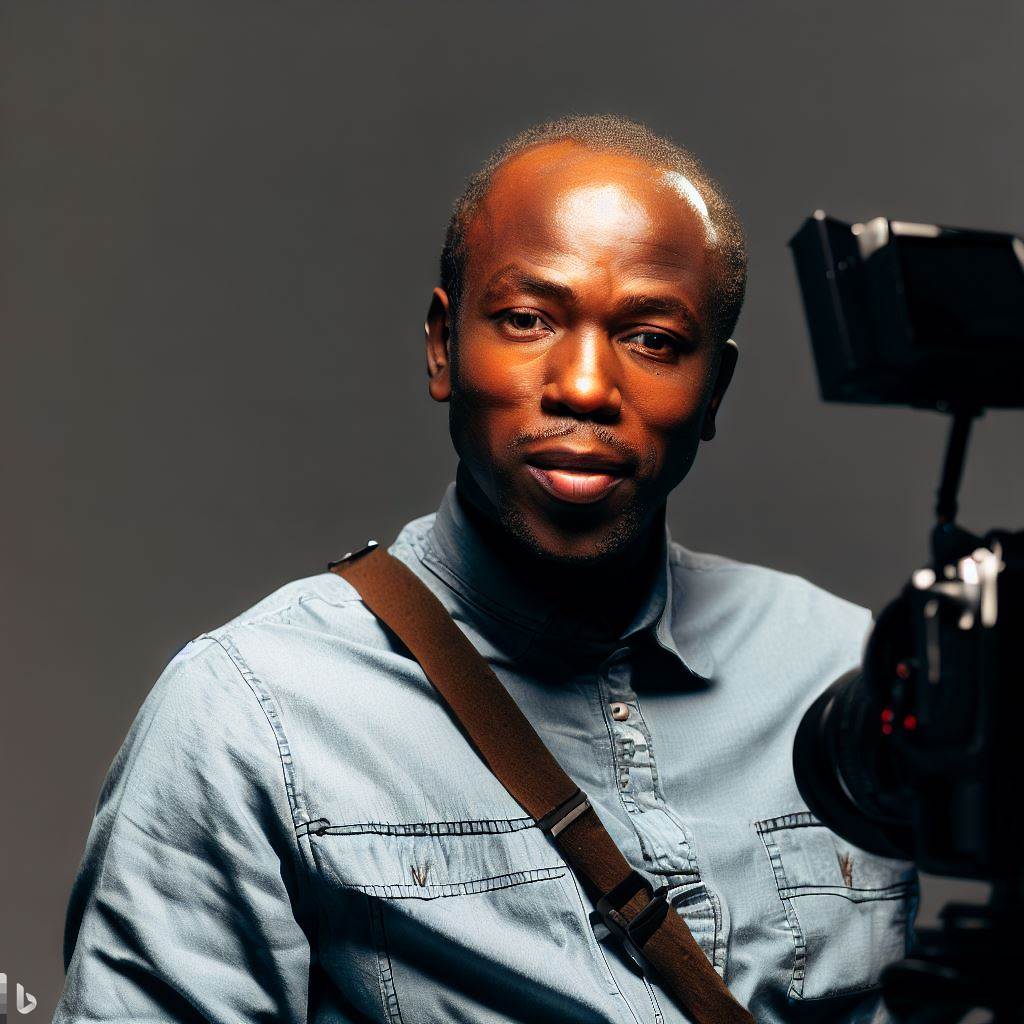
Balancing Creativity and Business
Managing Creative Aspirations with Industry Demands
In the ever-evolving world of photography, balancing creativity with the demands of the industry is crucial.
Photographers often find themselves torn between pursuing their artistic visions and meeting client expectations.
For this professional Nigerian photographer, striking this balance is an ongoing journey that requires constant adaptation and flexibility.
The photographer believes that staying true to their creative aspirations while responding to industry needs is key to long-term success.
Finding New Clients and Collaborations
To maintain a thriving photography business, finding new clients and collaborations is essential.
This photographer has honed their networking skills and developed strategic marketing tactics to expand their client base.
They actively participate in industry events and engage with potential clients through social media platforms.
Additionally, collaborations with other creative professionals enable them to tap into new markets and reach a wider audience.
Business Model and Pricing Strategies
Creating a sustainable photography business requires a carefully crafted business model and effective pricing strategies.
The photographer has diversified their revenue streams by offering a range of services, including wedding photography, commercial shoots, and portraits.
This allows them to cater to different client needs and maximize their income potential.
Furthermore, their pricing strategies are adaptable, taking into account factors such as project scope, client budget, and market demand.
Maintaining a Sustainable and Profitable Photography Business
For this photographer, maintaining a sustainable and profitable photography business goes beyond just capturing beautiful images.
Organization and financial management play a crucial role in achieving long-term success.
They invest time in maintaining a streamlined workflow, ensuring efficient post-production, and delivering high-quality work in a timely manner.
Moreover, building strong relationships with clients is fundamental to securing repeat business and positive referrals.
By consistently delivering exceptional service and exceeding client expectations, they ensure a steady stream of projects and a profitable business.
Generally, balancing creativity and business is a continuous challenge for professional photographers.
This Nigerian photographer exemplifies the ability to manage their creative aspirations while catering to industry demands.
By actively seeking new clients and collaborations, implementing a strategic business model, and prioritizing sustainable practices, they have created a thriving photography business.
Their approach serves as an inspiration to aspiring photographers, reminding them that with perseverance and adaptability, success is within reach.
Nigerian Photography Trends and Future Outlook
Current trends and developments in Nigerian photography
- Social media platforms have become the primary medium for sharing and promoting Nigerian photography.
- There is a growing interest in documentary and street photography, capturing the essence of everyday Nigerian life.
- Many photographers are exploring conceptual and fine art photography, adding a unique touch to their work.
- Increased collaborations between photographers and fashion designers are giving rise to stunning fashion photography.
- Nigerian photographers are gaining international recognition and exhibiting their work globally.
- Photographers are embracing new technologies, such as drone photography and virtual reality.
Challenges faced by the industry and how photographers adapt
- Competition is fierce in the photography industry, with many talented individuals vying for recognition.
- Lack of proper regulations and copyright laws makes it difficult to protect photographers’ work.
- Equipment and studio costs can be expensive, making it challenging for aspiring photographers to establish themselves.
- Limited access to affordable training and mentorship programs hinders the growth of emerging photographers.
- The Nigerian market often undervalues photography, leading to low pricing and financial struggles for professionals.
- Photographers adapt by diversifying their services, offering workshops, and leveraging social media for exposure.
- They form photography associations and communities to share knowledge, resources, and support each other.
Offer insights into the future of Nigerian photography based on the photographer’s perspective
As a professional Nigerian photographer, I believe the future is promising for the industry.
Publish Your Professional Profile, Business or Brand
Showcase your expertise, gain trust, and boost visibility instantly on Professions.ng.
Publish NowWith advancements in technology and the increasing appreciation for visual storytelling, photographers have more opportunities than ever before.
However, challenges need to be addressed:
- Developing stricter copyright laws and regulations to protect photographers’ work and ensure fair compensation.
- Establishing affordable training programs and mentorship initiatives to nurture emerging talents.
- Increasing investment in photography education and infrastructure, including studios and equipment rental spaces.
- Collaborating with government bodies and organizations to create platforms for photographers to showcase their work.
- Encouraging a shift in mindset within the Nigerian market to appreciate and value the art and craftsmanship of photography.
- Exploring international collaborations and exchange programs to broaden exposure and open new markets.
Overall, Nigerian photography is heading towards a bright future.
With the right support, infrastructure, and recognition, Nigerian photographers can continue to push boundaries, capture compelling stories, and contribute to the global photography scene.
Conclusion
In this blog post, we explored a day in the life of a professional Nigerian photographer.
A day in the life of a professional Nigerian photographer is a fascinating journey. They blend technical expertise, artistic flair, and an unyielding passion for capturing the essence of their subjects and surroundings.
From the early morning preparations to the late-night editing sessions, photographers navigate a demanding but incredibly rewarding profession.
They face challenges such as fluctuating client demands, equipment maintenance, and the pursuit of creativity, but these challenges are outweighed by the joy of freezing moments in time, telling compelling stories, and leaving a lasting impact through their work.
Nigerian photographers play a pivotal role in preserving culture, documenting history, and adding an artistic dimension to everyday life.
They are not mere image-takers; they are visual storytellers, cultural ambassadors, and agents of change. Their craft enriches our lives and broadens our perspectives.
As we peel back the curtain on their daily lives, we appreciate the dedication, innovation, and resilience that define the Nigerian photography scene. It’s a world where every click of the shutter represents a blend of technical mastery and creative vision.
From the bustling streets of Lagos to the serene landscapes of Enugu, Nigerian photographers capture the beauty and diversity of their nation with finesse. They inspire, provoke thought, and spark conversations through their powerful imagery.
So, the next time you admire a breathtaking photograph that transports you to a different world or invokes strong emotions, remember the hardworking professionals behind the lens. They are the unsung heroes, silently shaping our perception of the world, one frame at a time.
Photography in Nigeria is a vibrant and evolving art form, deserving of our appreciation and support.
[E-Books for Sale]
The Nigerian Professional's Playbook: Strategies to Accelerate Your Career and Build Lasting Wealth
₦2,000 • 10 Chapters • 33 pages
Fed Up with Stagnant Salaries and Career Frustration? Grab the Proven Nigerian Playbook for Just ₦2,000!
See All 10 Chapters of this E-Book
500 Cutting-Edge Tech Startup Ideas for 2024 & 2025: Innovate, Create, Dominate
₦3,000 • 500 Tech Startup Ideas • 62 pages
You will get inspired with 500 innovative tech startup ideas for 2024 and 2025, complete with concise descriptions to help you kickstart your entrepreneurial journey in AI, Blockchain, IoT, Fintech, and AR/VR.
See All 500 Tech Startup Ideas of this E-Book
Mastering Project Management: A Comprehensive Guide to GanttPRO and Microsoft Project
₦3,150 • 10 Chapters • 102 pages
Explore 'Mastering Project Management,' an e-book guide on using GanttPRO and MS Project for optimal project success.
See All 10 Chapters of this E-Book
Migration Mastery: From Nigeria to Abroad
₦2,450 • 30 Chapters • 244 pages
Unlock success in your migration from Nigeria with our e-book. Comprehensive guide for a smooth transition abroad.
See All 30 Chapters of this E-Book
The Future of Work in Nigeria: Trends, Professions, and Possibilities
₦3,500 • 24 Chapters • 188 pages
Navigate Nigeria's evolving job landscape with our e-book on the future of work. Gain key insights into tech innovations and cultural shifts. Stay ahead; purchase today.
See All 24 Chapters of this E-Book
50 Simple Tips to Stay Ahead of Your Peers
₦1,750 • 5 Chapters • 25 pages
Master success with '50 Simple Tips to Stay Ahead of Your Peers'. Unlock strategies to outshine and excel in every aspect of life.




